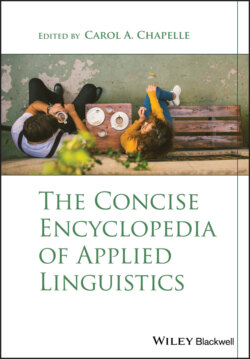Читать книгу The Concise Encyclopedia of Applied Linguistics - Carol A. Chapelle - Страница 97
Research in the Assessment of Integrated Skills
ОглавлениеResearchers have attempted to understand integrated tasks by comparing test takers' performances on them with their performances on tasks requiring only one skill. Research comparing independent and integrated writing task performance has found that overall scores show similarities (Brown, Hilgers, & Marsella, 1991) and are positively correlated (Sawaki et al., 2013; Zhu et al., 2016). Yet closer investigation of discourse features has revealed some differences, in such features as grammatical accuracy, development, and rhetorical stance (Cumming et al., 2005). For example, in studying the prototype TOEFL iBT task, Cumming et al. (2005) found that integrated task responses were shorter, but used longer words and more variety in words when compared to independent writing tasks. The independent writing responses were scored higher in certain rhetorical features, such as the quality of propositions, claims, and warrants.
Studies investigating the test‐taking process across tasks types have found evidence that some test takers follow a similar approach for both independent and integrated tasks, while others treat integrated tasks as requiring synthesis and integration strategies, such as scanning the text for ideas to include in their essay (Plakans, 2009; Barkaoui, 2015). However, the study of test‐taking processes on two different integrated tasks also revealed differences across tasks: Ascención (2005) found that read‐and‐respond writing tasks required more planning and monitoring than a read‐and‐summarize task.
Researchers have also attempted to reveal effects of proficiency and task familiarity on integrated task performance. Not surprisingly, higher‐proficiency writers produce longer responses to integrated writing tasks than lower‐level writers (Cumming et al., 2005; Gebril & Plakans, 2013). Expected differences in grammatical accuracy also occur across levels of proficiency, as well as in organization and the use of integration source texts (Cumming et al., 2005; Gebril & Plakans, 2013; Plakans & Gebril, 2017). Research results also suggest that prior experience with integrated tasks, educational level, first‐language writing experience, and interest in writing may affect performance (Ascención, 2005; Wolfersberger, 2013). The role of texts is also important for developing integrated assessment, as well as for understanding scores. In a study of different source texts used in summary writing, Li (2014) found that test takers performed better in summarizing expository texts, despite their opinions that it was easier to summarize narrative text.
